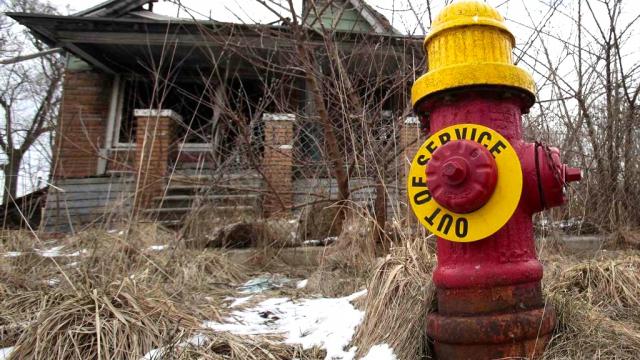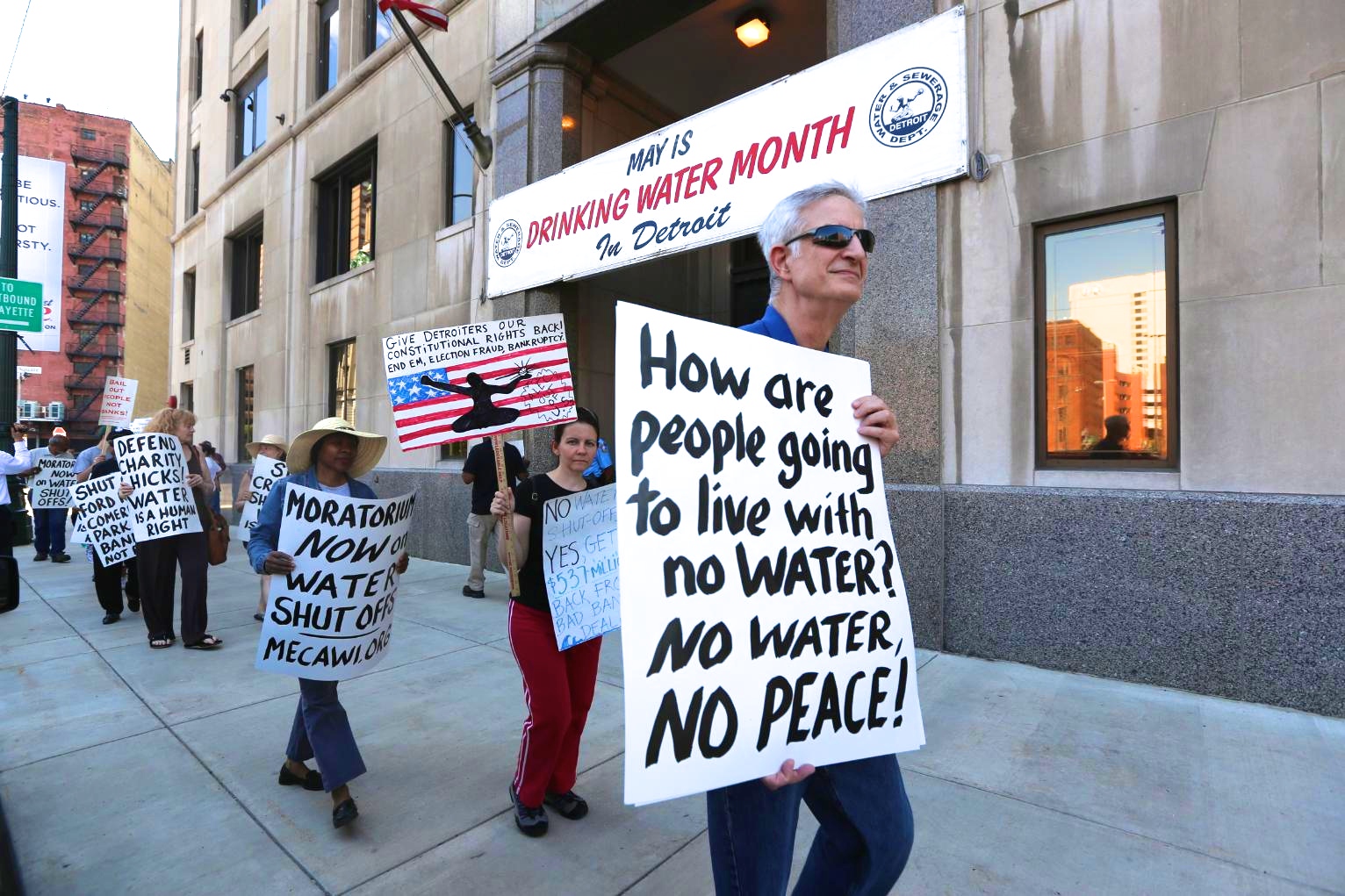
Detroit made international news last month when its municipal water board resumed cutting off water to residents with unpaid bills. With thousands of community members struggling in homes with no running water, local groups reached out to the United Nations special rapporteur on the human right to safe drinking water and sanitation to intervene. Last Wednesday, U.N. officials responded, calling the water department’s actions a “violation of the human right to water and other international human rights.”
The Detroit Water and Sewerage Department’s decision to cut off residents with unpaid bills has put the city in the crosshairs of a national press seemingly fascinated by yet another story of its dance on the economic brink. Community groups, zeroing in on residents’ inability to bathe, cook or use the toilet, saw the shutoffs as an indication that the department is desperate to bring down its $5.7 billion water and sewer debt.
Kevyn Orr, Detroit’s emergency manager, appointed by Gov. Rick Snyder last year to see the city through bankruptcy, is considering the privatization of the city’s water. According to a water department spokesman, “DWSD has no say in the matter.”
Any such consideration of full (or even partial) privatization of a vital public good such as water — especially under the guise that such a move would help straighten out the city’s finances — would be tremendously shortsighted.
Downsides of Private Water
Privatization of water has a terrible track record in the U.S. and around the world. According to a white paper out last month from Corporate Accountability International (CAI), water privatization overwhelmingly leads to higher prices for cities and people and, in many cases, decreased efficiencies.
In the United Kingdom, two decades of privatization increased the average cost of water by 50 percent. In France, the price of water shot up 16 percent under private management, the result in part of the private water companies’ legal mandate to return profit to their shareholders. In contrast, a public water system puts any revenue from ratepayers back into the system, which is how Paris saved $46 million in the first year after taking back the water department from a private company — and lowered rates for residents.
In New Jersey, where United Water, the U.S. affiliate of the global water company Suez, has a number of contracts, the firm has lobbied against bills requiring notification of rate increases or keeping local governments better apprised of water supplies, according to the CAI report. (Full disclosure: I am a strategic adviser to CAI.)
In Stockton, California, four years of private water — as well as neglected infrastructure and contract noncompliance — ended with the city reclaiming public control. In fact, CAI reports that since 2002, more than 20 municipalities in the U.S. have taken back control from private companies such as United Water.
Private water companies pitch their services as a way to balance budgets, but Detroit's public water system is struggling in large part due to policy decisions, not because of some inherent inefficiency of the public sector.
An Unjust Water Policy
A big reason many of Detroit’s poorer residents are struggling with their water bills is inequitable water-pricing. The United States uses a uniform unit pricing scheme for water delivery; it’s a form of cost allocation that allows rate differences between categories (say, residential or commercial users), but not between different types of users — who might have vastly different incomes — within those categories.
Because water rates are felt disproportionately by low-income consumers, they burden public districts that have less wealthy residents. In a 2013 report on local government spending on public water, three mayors — Philadelphia’s Michael Nutter; Scott Smith of Mesa, Arizona; and Kevin Johnson of Sacramento, California — called the pricing scheme “regressive,” adding:
"Current public water cost allocation schemes that rely on uniform user class pricing place a tremendous financial burden on the lower median income households in a community. The financial burden is both substantial, and sometimes, widespread in a community."
It’s a conclusion that might sound abstract but is very real to the 12,500 Detroit households that had their water cut off so far this year.
This water pricing structure was put in place with the birth of the Clean Water Act, but back in the 1970s when it passed there was significantly more federal support for local water districts. Since then, according to the watchdog group Food & Water Watch, federal spending “on improvements to our water and sewer systems has declined by more than 80 percent.” Even as the 2008-10 recession pushed more and more families into debt and increased unemployment, local water systems were forced to carry a greater burden for water services. In 2010, local government spent $111.4 billion on water needs — an all-time high.
With all eyes on Detroit, it’s important to realize what we’re seeing: A city water department cutting off residents appears — and is — extreme, but it’s a taste of what private water companies do. “The rate hikes and service cutoffs we’re seeing in Detroit,” CAI’s Erin Diaz told me, “while uncharacteristic of public water systems, are actually a very real glimpse into what the city’s system could be like if privatized — we’ve seen it all over the world.”
We need a renewed investment in public water. The mayors’ report on local water and wastewater spending warned that without more robust federal and state support for water systems, communities around the country will increasingly feel the pinch. But the solution is not privatization; we need what the mayors called “a fresh look at local affordability and national water policy” — a more equitable water policy that does not leave districts or needy citizens in the lurch. For thousands of community members in Detroit, this fresh look isn’t happening quickly enough.
Anna Lappé is the author of "Diet for a Hot Planet: The Climate Crisis at the End of Your Fork and What You Can Do About It," and the co-founder of the Small Planet Institute and Real Food Media Project.
3 WAYS TO SHOW YOUR SUPPORT
- Log in to post comments














